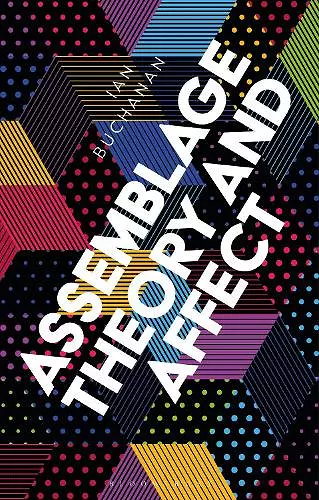Assemblage Theory and Affect
Format:Hardback
Publisher:Bloomsbury Publishing PLC
Publishing:19th Feb '26
£65.00
This title is due to be published on 19th February, and will be despatched as soon as possible.

The first introduction to two key concepts - assemblage and affect - in continental thought and art theory by a leading figure in the field.
In Assemblage Theory and Affect, Ian Buchanan continues the project he began in Assemblage Theory and Method, of demystifying the critical elements of the work of Deleuze and Guattari.
He argues that the concepts of assemblage and affect, which were separated at birth, need to be reunited if we are to fully understand what Deleuze and Guattari meant by these pivotal concepts. To this end, Assemblage Theory and Affect proposes three agenda-setting arguments that will change how we see the concepts of the assemblage and affect.
1. Affect is a function of desire – its powers are the powers we attribute to desire. As such, like desire it should be considered a psychical agency. The assemblage, the body without organs and the abstract machine are all components of this psychical agency.
2. Affect is a capacitating power – it empowers us to meet life. Affect is not the measure of our response to a given stimulus, it is rather the capacity we have to respond to a stimulus in the way that we do. This is the essential argument of Deleuze and Guattari’s schizoanalytic project which is a kind of survivor’s guide to late capitalism.
3. Thecapacitating power of affect depends upon the combinations of bodies without organs and abstract machines that we have been able to put together by means of the assemblages available to us. This is what Deleuze means by an ethics of desire.
Buchanan outlines the meaning of both concepts for contemporary philosophy, art, cultural and critical theory and politics. In applying these theories to real life practices and experiences, these concepts are given clarity and force.
A provocative and timely intervention, this book reinvigorates Deleuze and Guattari's assemblage thinking through the twin lenses of schizoanalysis and affect. It offers a powerful conceptual toolkit for examining how desire, affect, and assemblage shape the spatial dynamics of contemporary life. * Gordon Waitt, Emeritus Professor of Human Geography, University of Wollongong, Australia *
Ian Buchanan is one of Deleuze’s most wide-ranging interpreters, and in this book, he shows how Deleuze and Guattari’s well-known but often misunderstood theory of “affect” must be grounded in their assemblage theory, and more generally, in their project of schizoanalysis. Along the way, Buchanan provides comparisons with theorists such as Jameson, Massumi, and Delanda, and perhaps more importantly, shows the increasing relevance of affect theory to our contemporary politics. An essential read. * Daniel Smith, Professor of Philosophy, Purdue University, USA *
Assemblage Theory and Affect is one of those rare books of theory that does more than explain what was meant and instead provides a map for how one might think differently using concepts that never arrive fit for purpose. Buchanan tackles the complex history of affect theory, and by returning to its roots in Deleuze and Guattari’s work, re-orients a whole critical literature. Asking what happens if we see affect as the capacity to meet the day, Buchanan carefully shows that affect theory (and its relation to assemblage) might be one of the more useful ways of thinking about life and action in these troubled times.
The book takes the reader back to the original formulation of affect in the work of Deleuze and Guattari, and shows how the affect theory that we have assumed as emanating from their work bears only passing resemblance. In its articulation of affect’s relationship to desire, both grounded through Deleuze and Guattari’s blueprint of the assemblage, Assemblage Theory and Affect is a vibrant, thoughtful and often humorous request to think affect again.
Both assemblage theory and the concept of affect have been major drivers in new research in the humanities and social sciences, but just what do we mean by ‘assemblage’ and ‘affect’ and how might these terms be used in ways that are rigorous and genuinely transformative? Ian Buchanan has provided a guide, a genealogy and a provocative argument that should be necessary reading for anyone interested in the stakes of knowledge and method in the twenty-first century. * Claire Colebrook, Cecile Parrish Memorial Chair of English Literature, Monash University, Australia *
ISBN: 9781350268760
Dimensions: unknown
Weight: unknown
168 pages